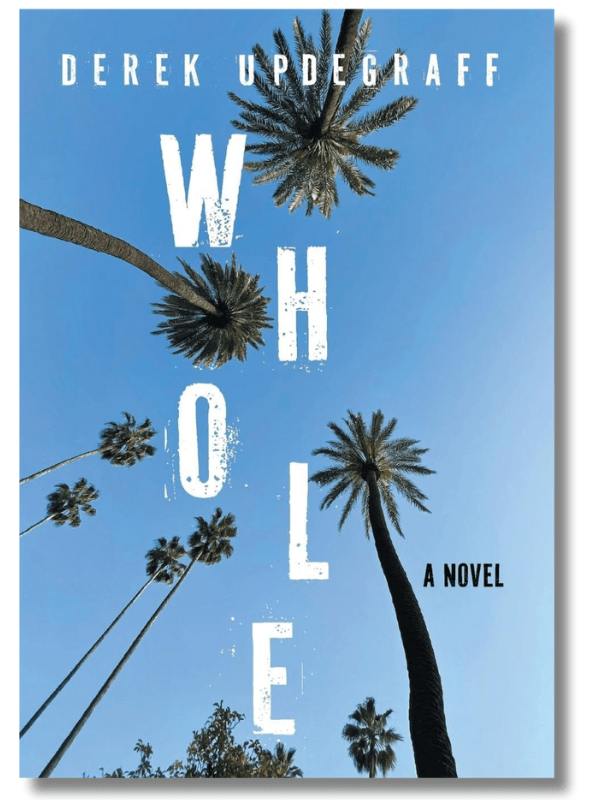Whole
by Derek Updegraff
Genre: Literary Fiction
ISBN: 9781639821686
Print Length: 146 pages
Publisher: Slant Books
Reviewed by Addison Ciuchta
A quiet exploration of solitude, love, and connection in a world where it’s difficult not to damage each other
Infatuated with his new girlfriend Ashley, Joe can’t help but check a text from her while he’s driving, causing him to collide with a homeless man named Ronnie on his bike. In apology, Joe visits Ronnie’s home, an orange tent in a dried-up riverbed and offers to purchase him a new bicycle, forming an odd relationship between them.
At the same time, Joe worries over the text that caused the crash, a text from Ashley saying they needed to talk. Throughout the novel, Joe struggles with finding his footing in the relationship and in his life, working at a cafe by day and impulsively wandering by night, when inspiration strikes writing short narratives stuck somewhere between poetry and fiction.
Each chapter is bookended by one-to-two-page short fictions, presumably written by Joe, that showcase the author’s uniquely lyrical writing style in quick narrative bursts about angels, boyhood, and death. They’re impactful and conceptually unique, sure to stick in my mind for a while to come.
“He felt a tug in his brain, a voice saying, Hey, you were only supposed to live here for playtime. But the mountain lion roared that playtime was over and this was home now and then devoured what was left of the delicate voice.”
The author’s run-on writing style lends a slow, meandering pace to the narrative that matches the main character’s issue, a lack of a sense of urgency or purpose in his life. His sole goal is wooing his new girlfriend, and, only sometimes, he agrees to help Ronnie when he calls, comfortable with working at a cafe by day and not working toward much of anything else by night. The author often starts sentences with “so” or “and,” and Joe references “putting this story down” as if he’s recounting the series of events in a journal, making the rambling an apt and tonally strong choice.
“So I’ll tell you now in case you’re wondering. It’s all important. All this stuff matters. What I’m telling you is: that lipstick was cherry red. I remember its brightness.”
Joe is often introspective, pondering his past relationships, choices in life, and childhood as he goes for walks or swims in the ocean. His reflective nature is contagious, making me wonder about some of his grand questions along with him.
His relationship with Ashley is realistically portrayed, capturing how a relationship might develop in real life as Joe worries over a fourth date, a we-need-to-talk-text, and her hesitation to sleep with him. He worries, too, over what and how to tell her about who he is and the mistakes he’s made, his impulsivity colliding with his want to keep Ashley sometimes leading him to do odd, creepy, or even violent actions.
“Lying there, I was thinking, How much of my life will I tell Ashley? How much about my dwindling friends and family members? How many of my stories will she want to hear?”
Perhaps because of the narrative style, the story sometimes lacks a strong sense of emotionality even during moments that could use more depth and grounding, like when Joe hits Ronnie with his car. Joe does not react with much emotion on the page despite such a shocking, traumatizing event, going to work after and even having a date with Ashley that night.
“So it’s the first morning of spring, and I hit a homeless man. Rammed right into the back of his bike. It’s a miracle he’s alive, Ronnie, the homeless guy I hit, since my car mangled his bike after he’d been thrown to the pavement.”
The events are often described after the fact or are just stated rather than actively happening on the page, veering toward telling rather than showing. Other sometimes brutal or happy events where you’d expect an emotional response are told with a matter-of-fact tone, leaving the reader to feel what Joe ought to.
Whole is a glimpse into one man’s struggle with finding love and satisfaction in a life that often happens to him. The main character’s comfortability to stay exactly where he is is, at times, a direct pushback against modern society’s insistence that everyone has a goal they must always be working toward. The style is rambling but lyrical, and the short fictions woven between chapters gleam. Whole is great for readers seeking an introspective reading experience with bonus short, short stories thrown in.
Thank you for reading Addison Ciuchta’s book review of Whole by Derek Updegraff! If you liked what you read, please spend some more time with us at the links below.
The post Book Review: Whole by Derek Updegraff appeared first on Independent Book Review.
